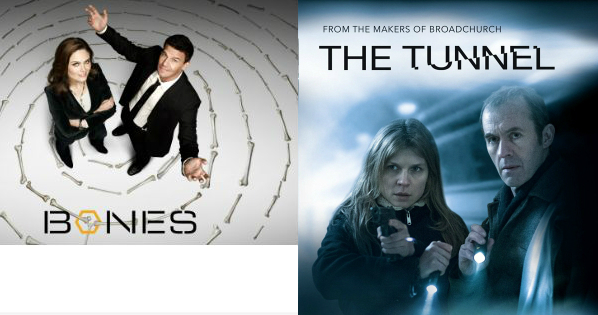
True confession: I love the emerging trope of strong, detached female leads in procedural crime shows. Temperance “Bones” Brennan, internationally acclaimed forensic anthropologist, from the TV show Bones was a seminal figure in this movement, and Elise Wasserman, workaholic, brilliant police officer from The Tunnel is a more recent iteration. (The Tunnel is the French/British remake of the Danish/Swedish series The Bridge. The Bridge has also been remade for American audiences as a US/Mexico TV crime drama.)
Though Bones is a kind of cheesy show (and getting cheesier and boring-er all the time), I have long loved Emily Deschanel‘s characterization of the logical, methodical scientist who solves crimes alongside her more emotional, intuitive male FBI partner, Seeley Booth. When we first meet Brennan, she is not only the leading forensic anthropologist in her field, but she is a physically capable women who’s an expert in martial arts and good with a gun. She also has a pragmatic attitude towards relationships and sex, often comparing both to animal and tribal cultures throughout the world and throughout history to explain human tendencies. Love, Brennan explains, is a chemical process in the brain and not the romanticized notion in which her partner, Booth, believes.

I also immediately liked the stone-faced Elise from The Tunnel with her calm rationale, her unwillingness to lie, and her dedication to solving homicides. Though difficult to work with, everyone respects Elise’s abilities as a detective (much like Brennan). Also like Brennan, Elise views sex as a practical necessity. She prefers to be alone, isn’t seeking companionship, and doesn’t become emotionally attached to her sex partners. She even tells her partner, Karl Roebuck (a more empathetic character for Stephen Dillane than his Stannis Baratheon of Game of Thrones fame), that her current lover wants her to change and that she doesn’t want to change.

Though I love this strong, intensely logical female lead character trope, it also raises some questions for me. I like the idea of reversing traditional gender roles by making the female lead the analytical one and the male lead the emotional one, but I wonder if, in a way, this is an attempt at the masculinization of the shows’ female characters? These characters literally have their emotions and their ability to express their emotions almost completely removed. Why did the writers think it was necessary to remove the emotions of its female characters in order to make them logical? This isn’t Star Trek; Brennan and Elise aren’t Vulcans. This subtly promotes the idea that logic and emotions are mutually exclusive, even part of a binary opposition. In particular, this dichotomy suggests that a women who is in touch with her emotions cannot possibly be rational, too. As women are so often associated with emotion, is muting Brennan and Elise’s emotions an attempt to make them more masculinely rational?

Interestingly enough, over the many seasons of Bones, the writers are actually changing Brennan, making her more readily emotional, quicker to cry or acknowledge her love, her fear, her sadness. At the same time, they have systematically made her more “feminine” by having her suddenly wanting many of the trappings of the traditional female role that she once dismissed (having a baby, cohabitating, and getting married, in particular). Brennen also seems to have forgotten her martial arts skills, is in need of frequent rescues, and no longer uses her gun. Not only that, but they gave her an unexplained supernatural experience that defies her atheism and points to the existence of a higher power. All these things undermine her identity and have slowly rewritten her into less of that subversive, independent female powerhouse role.

Another thing that gives me pause is that both Brennan and Elise are…abrasive. To strangers, they can come off as rude, insensitive, and self-important. Both women are, though, strikingly beautiful. Emily Deschanel brings her stark blue eyes and sexy, husky voice to the characterization of Brennan.

Even though they try to make Clémence Poésy look disheveled as Elise and maybe they’re attempting to make her seem plain because she’s not obviously made-up, but she’s model gorgeous.

This makes me question whether or not audiences would like these women and find their quirks so endearing if they weren’t so beautiful? Or, maybe, audiences might like them, but would studios trust audiences to like these unusual women if they weren’t knockout stunning…since pretty much all women on TV are required to meet a specific standard of beauty no matter what their personality may be?
Now, it’s my theory that both Brennan and Elise are most likely somewhere on the autism spectrum. Both women have trouble understanding the humor of others, reading the social or emotional cues of others, and observing social niceties.

I love that their communities are accepting and inclusive, that these women lead productive, successful lives, and their capability is rarely questioned. But why aren’t we talking about it? Why aren’t these shows acknowledging the truth about who these women are, the challenges they face, and the multifaceted nature of their triumphs? By not talking about it, these shows not only deny the identity and experiences of these women but also those of autism spectrum viewers and their community members. Announcing that your lead character is part of an underrepresented, marginalized group is a hugely important step in de-stigmatizing and giving a voice to that group.

Despite my speculations on the institutional sexism and shortcomings of the creators of Brennan from Bones and Elise from The Tunnel, I dig these women. They’re both smart, ambitious, unique, highly moral, and compassionate women who are fantastic role models for their female audience members (in spite of the apparent taming of Brennan through marriage and child rearing). I wish the shows were doing a few things differently…more better-ly, but all in all, Brennan and Elise are great characters who I love to watch, which says to me that both shows are doing something very, very right.
——-
